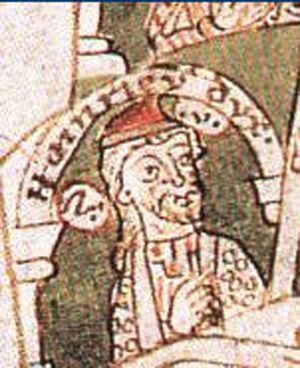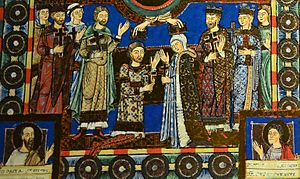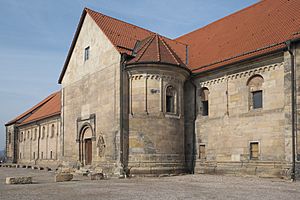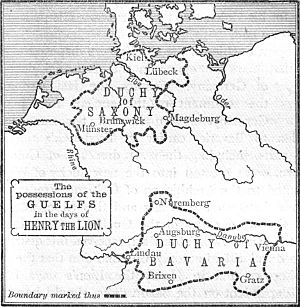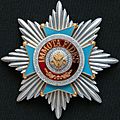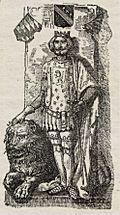Henry the Lion facts for kids
Quick facts for kids Henry the Lion |
|
|---|---|
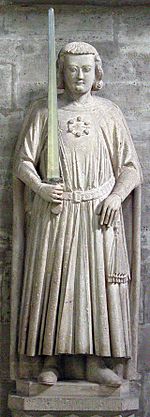
Statue in Brunswick Cathedral, ca. 1225-1250, said to represent Henry the Lion
|
|
| Duke of Saxony | |
| Reign | 1142–1180 |
| Predecessor | Albert the Bear |
| Successor | Bernard III |
| Duke of Bavaria | |
| Reign | 1156–1180 |
| Predecessor | Henry XI |
| Successor | Otto I |
| Born | c. 1129 Ravensburg |
| Died | 6 August 1195 (aged 65–66) Brunswick |
| Burial | Brunswick Cathedral |
| Spouse | |
| Issue |
|
| House | Welf |
| Father | Henry II, Duke of Saxony |
| Mother | Gertrude of Süpplingenburg |
Henry the Lion (German: Heinrich der Löwe; 1129/1131 – 6 August 1195) was a very powerful German prince from the Welf family. He was the Duke of Saxony from 1142 and the Duke of Bavaria from 1156. These were two of the most important regions in Germany at the time.
At the peak of his power, Henry controlled a huge area. It stretched from the North and Baltic Seas all the way to the Alps. He gained this power through smart political moves, military victories, and his family's rich inheritance.
Contents
Who Was Henry the Lion?
Henry the Lion was one of the most important figures in German history during the 12th century. He was known for his strength and determination, much like a lion. He helped shape the map of Germany by founding and developing many cities.
However, his power eventually clashed with that of his cousin, Emperor Frederick I Barbarossa. This led to a major conflict that changed Henry's life and the course of German history.
Early Life and Family Background
Henry was born in Ravensburg around 1129 or 1131. His father was Henry the Proud, who was Duke of both Bavaria and Saxony. His mother was Gertrude of Süpplingenburg, whose father was Emperor Lothair III. This meant Henry had a very important family background, giving him claims to vast lands.
Henry's father died in 1139 when Henry was still a child. The King at the time, Conrad III, took away Henry the Proud's duchies. But Henry the Lion never gave up his claim to these lands. In 1142, King Conrad III returned Saxony to him.
Building a Strong Realm
Henry was a very active ruler. He joined the Wendish Crusade in 1147, which helped him gain more influence. In 1156, the new Emperor, Frederick Barbarossa, gave Bavaria back to Henry. This made Henry one of the most powerful princes in the Holy Roman Empire.
Henry is famous for founding and growing many important cities. He founded Munich in 1157 and Lübeck in 1159. He also helped develop cities like Augsburg, Hildesheim, and his capital, Brunswick.
In Brunswick, Henry showed his power by putting up a large bronze statue of a lion in 1166. This was the first bronze statue north of the Alps. Later, he built the impressive Brunswick Cathedral near the statue.
Marriages and Children
In 1147, Henry married Clementia of Zähringen. This marriage brought him more land in Swabia. However, he divorced her in 1162, possibly because Emperor Frederick Barbarossa wanted to reduce Henry's influence in that area.
In 1168, Henry married Matilda of England. She was the daughter of King Henry II of England and Eleanor of Aquitaine. Matilda was also the sister of the famous King Richard I of England, known as Richard the Lionheart. This marriage connected Henry to one of the most powerful royal families in Europe.
Challenges and Exile
Henry the Lion was a loyal supporter of his cousin, Emperor Frederick Barbarossa, for many years. He helped Frederick in his wars in Italy, often turning the tide of battles with his Saxon knights. For example, he helped Frederick win the sieges of Crema and Milan.
However, their relationship began to sour. In 1172, Henry went on a pilgrimage to Jerusalem. When he returned, he refused to help Frederick in another invasion of Italy in 1174. Henry felt that these Italian wars were not worth his effort unless Frederick gave him the important city of Goslar. Frederick refused this request.
Frederick Barbarossa was very angry that Henry didn't support him. Other German princes were also jealous of Henry's growing power. So, in 1180, Frederick had Henry put on trial, even though Henry wasn't there. The court decided that Henry had disobeyed the Emperor and took away his lands. They declared him an outlaw.
Frederick then invaded Saxony with his army. Henry's allies left him, and he had to surrender in November 1181 in Erfurt. He was sent away from Germany for three years, staying with his father-in-law in Normandy. He was allowed to return in 1185 but was exiled again in 1188. His wife Matilda died in 1189.
His Later Years
When Emperor Frederick Barbarossa went on the Crusade of 1189, Henry returned to Saxony. He gathered an army and took back the city of Bardowick, punishing it for its disloyalty. Only the churches were left standing.
However, Barbarossa's son, Emperor Henry VI, defeated Henry the Lion again. But in 1194, as he was getting older, Henry made peace with the Emperor. He returned to his smaller lands around Brunswick, where he spent his final years peacefully. He supported arts and architecture until his death on August 6, 1195.
Henry's Children
Henry had several children from his two marriages:
- From his first wife, Clementia of Zähringen:
- Gertrude of Bavaria (1155–1197), who became Queen of Denmark.
- From his second wife, Matilda of England:
- Matilda (1172–1204)
- Henry V, Count Palatine of the Rhine (around 1173–1227)
- Lothar of Bavaria (around 1174–1190)
- Otto IV, Holy Roman Emperor (around 1175–1218), who later became an Emperor himself.
- William of Winchester, Lord of Lüneburg (1184–1213)
Henry also had a daughter named Matilda with his lover, Ida von Blieskastel.
A Lasting Legacy
The Henry the Lion Bible is a beautiful book from 1170 that is still in excellent condition today. It is kept in the Herzog August Library in Wolfenbüttel, Germany.
Henry the Lion is still a well-known figure. During World War I, a statue of Henry the Lion, called Eiserner Heinrich (Iron Henry), was used to raise money for the war effort in Brunswick.
Gallery
-
Henry the Lion on the coat of arms of Schwerin
Henry in Stories and Legends
After his death, Henry the Lion became the subject of a popular folktale called the Heinrichssage. This story was even turned into an opera called Enrico Leone.
A famous part of the Heinrichssage tells a fictional story about Henry's trip to the Holy Land. The legend says that Henry saw a fight between a lion and a dragon. He helped the lion defeat the dragon. After that, the loyal lion stayed with Henry and followed him all the way back home. When Henry died, the lion was so sad that it refused to eat and died of grief on Henry's grave. The people of Brunswick then built a statue to honor the lion. This legend also inspired a Czech tale about a knight, which is shown on a column on Charles Bridge in Prague.
See also
 In Spanish: Enrique el León para niños
In Spanish: Enrique el León para niños
 | Sharif Bey |
 | Hale Woodruff |
 | Richmond Barthé |
 | Purvis Young |


